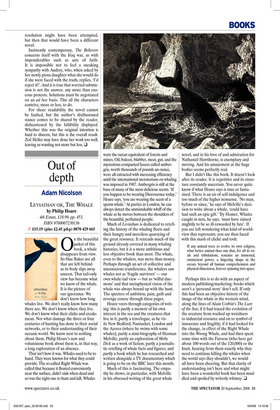Out of depth
Adam Nicolson
LEVIATHAN OR, THE WHALE by Philip Hoare 4th Estate, £18.99, pp. 453, ISBN 9780007230136 ✆ £15.19 (plus £2.45 p&p) 0870 429 665 On the beautiful jacket of this book, a whale disappears from view. Its blue flukes are all that are left behind as its body slips away unseen. That tail-only view has become what we know of the whale. It is the picture of our ignorance. We don’t know how long whales live. We don’t really know how many there are. We don’t know where they live. We don’t know what their clicks and creaks mean. Nor what damage the three or four centuries of hunting has done to their social networks, or to their understanding of their oceanic world. We know next to nothing about them. Philip Hoare’s new and voluminous book about them is, in that way, a long exploration of an absence.
That isn’t how it was. Whales used to be to hand. They were known for what they could provide. The so-called Right Whale was called that because it floated conveniently near the surface, didn’t sink when dead and so was the right one to hunt and kill. Whales were the ocean equivalent of forests and mines. Oil, baleen, blubber, meat, gut, and the mysterious compacted faeces called ambergris, worth thousands of pounds an ounce, were all extracted with increasing efficiency until the international moratorium on whaling was imposed in 1987. Ambergris is still at the base of many of the most delicious scents. ‘If you happen to be wearing Dioressence today,’ Hoare says, ‘you are wearing the scent of a sperm whale.’ At parties in London, he can always detect the unmistakable whiff of the whale as he moves between the shoulders of the beautiful, perfumed people.
Much of Leviathan is dedicated to retelling the history of the whaling fleets and their hungry and merciless quarrying of the great resource. It retreads much of the ground already covered in many whaling histories, but it is a more ambitious and less objective book than most. The whale, even to the whalers, was more than money. Perhaps through an act of collective and unconscious transference, the whalers saw whales not as ‘fragile survivors’ — our own whale-tail view — but as ‘wilful daemons’ and that metaphysical vision of the whale was always bound up with the hunt. The spectres of ambition, pain, guilt and revenge course through these pages.
Hoare veers through categories of writing: this is partly a memoir of his own interest in the sea and the creatures that live in it; partly a travelogue, as he visits New Bedford, Nantucket, London and the Azores (where he swims with some whales); partly a mini-biography of Herman Melville; partly an exploration of Moby Dick as a work of fiction; partly a journalistic retelling of whale facts and figures; and partly a book which he has researched and written alongside a TV documentary which is going to be on the BBC later this month.
Much of this is fascinating. The empathy he shows, in particular, with Melville in his obsessed writing of the great whale novel, and in his love of and admiration for Nathaniel Hawthorne, is exemplary and moving. And his amazement at the huge bodies seems perfectly real.
But I didn’t like this book. It doesn’t look after its reader. It is repetitive and its structure constantly uncertain. You never quite know if what Hoare says is true or fantasised. There is an air of self-indulgence and too much of the higher nonsense. ‘No man, before or since,’ he says of Melville’s decision to write about a whale, ‘could have had such an epic gift.’ Try Homer. Whales caught in nets, he says, ‘must have sinned mightily to be so ill-rewarded by fate’. If you are left wondering what kind of worldview that represents, you are then faced with this mash of cliché and tosh:
If any animal were to evolve its own religion, what better animal than one that, for all its trials and tribulations, remains an immortal, omniscient power, a lingering shape in the ocean, beyond all human comprehension and physical dimension, forever spinning into space.
Perhaps this is to do with an aspect of modern publishing/marketing: books which aren’t a ‘personal story’ don’t sell. If only this had been an objective history of the image of the whale in the western mind, along the lines of Alain Corbin’s The Lure of the Sea; if it had traced the evolution of the creature from washed up weirdness to industrial resource and on to symbol of innocence and fragility; if it had looked for the change, in effect of the Right Whale into the Wrong Whale, and had then spent some time with the Faroese (who here get about 100 words out of the 120,000) or the Inuit, hearing from them exactly why they need to continue killing the whales when the world says they shouldn’t, we would all have been cheering. But that clarity of understanding isn’t here and what might have been a wonderful book has been muddled and spoiled by writerly whimsy. ❑










































































 Previous page
Previous page